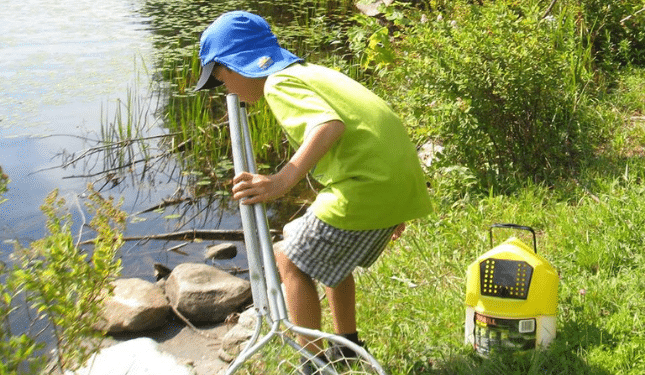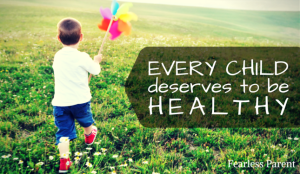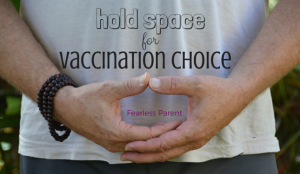My childhood afternoons in the 1970s were spent mostly outdoors. I played with my brothers and neighborhood friends, riding our bikes around, playing tag, or hanging out in a thicket of woods behind our house. The woods were tiny, but to me they seemed immense and full of surprises: berries to decorate a mud cake, rocks that seemed laced with gold, the occasional cracked robin’s egg. There were no adults around in my memories of those days; we were in our own world. We owned our world.
Today, it’s rare for kids to spend so much time outdoors on their own. Instead of unstructured outdoor play, our kids have scheduled play dates and structured activities. Between 1981 and 1997, the amount of time kids spend outdoors fell by a staggering 50 percent. In their limited free time, kids are likely to be indoors and on screens: a Kaiser Family Foundation study found that kids spend more than 7.5 hours using some sort of electronic media every day. The combination of overscheduling, lack of freedom to roam, and the temptations of electronic media means that American kids today spend a mere 4-7 minutes a day, on average, outdoors doing unstructured play.
Sedentary indoor time isn’t good for our kids. They’re experiencing an epidemic of childhood obesity and a worrisome disconnect with the natural world. It’s clear kids need to spend more time outdoors. Here are five inspiring reasons to include more outdoor time in your child’s day:
#1: It’s healthier
Numerous studies show that being outdoors puts people on the path to a healthier life in every dimension, both physical and mental. Children who spend time outdoors are on the whole healthier than those who do not. Spending time outdoors is the “strongest predictor of physical activity,” and physical activity in childhood is crucial to fostering lifelong healthy habits and preventing childhood and adulthood obesity. Children who are in the habit of being active are far more likely to become active adults. Outdoor time, especially in the summer, is an important way for kids to build up a reserve of Vitamin D, which is crucial for good health. Recent studies have even found that outdoor recess time can play a role in minimizing or preventing nearsightedness in children.
#2: It builds intelligence
Free play is important for children’s brain development, and the best free play happens outdoors. Play helps children to problem solve and helps them to build self-regulation (which is important for academic success but has been declining in recent years: the average five year old today has the self-regulation skills of a three year old 60 years ago.) Spending time in free play outdoors, especially with other children, fosters perspective taking and social intelligence as well: as children play pick up games or engage in imaginary play with one another, they are motivated to figure out how to negotiate or get along to keep the play going. The natural world is full of patterns, and observing and classifying these patterns, as kids are wont to do when playing outdoors, is a great way to build early math skills. Outdoor play is hands-on and experiential – an effective way for young children to learn – and all that mucking about in the dirt even exposes children to bacteria which scientists believe could improve their ability to learn new tasks.
#3: It fosters initiative and creativity
Unstructured outdoor time may appear purposeless, but is actually full of interior richness that is ripe ground for nurturing creativity. The materials children use when playing outdoors are not predetermined by a toy manufacturer, but open-ended: sticks, stones, shells, leaves, and dirt – all of which can be shaped into anything a child imagines them to be. Being bored is a good thing: kids who are given downtime and space learn how to understand what they want to do and take the initiative. Unlike an electronic game or a structured team sport, unstructured free time outdoors is totally free of guidance or direction – a welcome rarity in today’s world.
#4: It calms them down
A number of studies, many conducted by researchers at the Landscape and Human Health Laboratory at the University of Illinois at Urbana-Champaign, suggest that spending time outdoors is helpful for disorders such as anxiety or ADHD. One study found that spending time in “green, outdoor settings” significantly reduced impulsivity and inattention in young children. Another found that regular time outdoors in an open green space helped reduce hyperactivity. For maximum benefit, the greener the better: spend time at a farm, a park, or a backyard.
#5: It’s their birthright
Richard Louv, author of Last Child in the Woods and founder of the Children and Nature Network, coined the term “nature-deficit disorder” to describe the state of nature disconnect modern children are suffering from today. Our kids know a lot about the world – but aren’t intimately familiar with it. He writes:
Today, kids are aware of the global threats to the environment—but their physical contact, their intimacy with nature, is fading. That’s exactly the opposite of how it was when I was a child.
As a boy, I was unaware that my woods were ecologically connected with any other forests. Nobody in the 1950s talked about acid rain or holes in the ozone layer or global warming. But I knew my woods and my fields; I knew every bend in the creek and dip in the beaten dirt paths. I wandered those woods even in my dreams. A kid today can likely tell you about the Amazon rain forest—but not about the last time he or she explored the woods in solitude, or lay in a field listening to the wind and watching the clouds move.
Louv holds that children are innately drawn to the natural world, and suffer from depression, anxiety, obesity, and other ills when they are unable to spend enough time in nature. A return to nature and ample time in our own backyards, local woods, fields, ponds, mountains, and oceans is what children need to be restored to the state they were meant to be in.
The freedom to roam is a key factor in getting kids outdoors. In Japan, Germany, Sweden, Finland, Switzerland, and many, many other countries I’ve visited or researched, it’s common and expected for young children go about on their own, which makes it easy to walk to a park, bike around the neighborhood, or run over to a friend’s house. The Free Range Kids blog is a fantastic source of information and support for parents who are interested in giving their children the opportunity to be out in the world on their own.
What are your favorite reasons for getting your kids outdoors? How different is your childhood from the childhood your children are experiencing now, and what, if anything, would you like to see change?
Christine Gross-Loh is the author of the new book Parenting Without Borders: Surprising Lessons Parents Around the World Can Teach Us.













August 11, 2013 6:06 pm
Comments 0